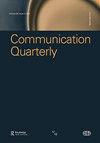Aggressive Superior-Subordinate Communication as a Predictor of Occupational Outcomes among Roman Catholic Sisters and Priests in India
IF 1
Q2 COMMUNICATION
引用次数: 1
Abstract
ABSTRACT The research reported here responds to two calls for research: 1) to study organizational communication in religious settings, and 2) to extend the study of communication beyond WEIRD samples (Western, Educated, Industrialized, Rich, Democratic). In answering those calls, we examined aggressive superior-subordinate communication in ecclesiastical occupations (EO) in the Roman Catholic Church in India. Consistent with prior research, superior verbal aggressiveness predicted negative subordinate responses and was a stronger predicter than superior argumentativeness, which predicted positive subordinate responses. These patterns, however, were qualified by the interactions observed. Specifically, superior aggressive communication was a stronger predictor of responses among priests than sisters, and it predicted more positive job outcomes for priests (e.g., higher job satisfaction), but more negative ones for sisters (e.g., lower job satisfaction). Furthermore, the positive verbal aggressiveness-occupational outcomes relationships run counter to US-based aggressive communication theory and empirical research, as does the positive correlation observed between argumentativeness and verbal aggressiveness. Results of this research underscore the importance of testing the generalizability of communication knowledge originating from WEIRD samples to non-WEIRD populations.侵略性的上下级沟通作为印度罗马天主教修女和神父职业结果的预测因子
摘要本文的研究回应了两个研究呼吁:1)研究宗教环境中的组织沟通,2)将沟通研究扩展到WEIRD样本之外(西方、受过教育、工业化、富裕、民主)。在回应这些呼吁时,我们研究了印度罗马天主教会在教会职业(EO)中咄咄逼人的上下级沟通。与先前的研究一致,高级言语攻击性预测消极的从属反应,并且比高级议论文性更强的预测力,后者预测积极的从属反应。然而,通过观察到的相互作用,这些模式是合格的。具体而言,与姐妹相比,更积极的沟通更能预测牧师的反应,它预测牧师的工作结果更积极(例如,更高的工作满意度),但姐妹的工作结果则更消极(例如,工作满意度更低)。此外,积极的言语攻击性-职业结果关系与基于美国的攻击性沟通理论和实证研究背道而驰,争论性和言语攻击性之间的正相关也是如此。这项研究的结果强调了测试源自WEIRD样本的传播知识对非WEIRD人群的可推广性的重要性。
本文章由计算机程序翻译,如有差异,请以英文原文为准。
求助全文
约1分钟内获得全文
求助全文

 求助内容:
求助内容: 应助结果提醒方式:
应助结果提醒方式:


